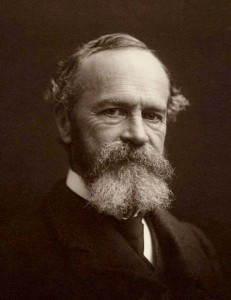
| Born: Jan 11, 1842 in New York City, NY |
| Died: Aug 26, 1910 (at age 68) in Tamworth, NH |
| Nationality: American |
| Fields: Psychology |
| Famous For: Father of American Psychology |
William James was a famous American psychologist and philosopher who was also professionally trained as a physician. Born in January of 1842, he is acknowledged as the father of American psychology. Many consider James to be one of the leading thinkers of late 19th century and one of the most prominent philosophers the US has ever produced.
Early Years
James was born into a wealthy family in New York City. Literary and intellectual brilliance was inherited in the James family and kind of became tradition. His father, Henry James Sr., was well acquainted with intellectual and literary elites of his times. His brother, Henry James was a prominent novelist and his other sibling, Alice James, was a diarist.
James also enjoyed writing on varied topics, including psychology, religion, education, epistemology, metaphysics and mysticism. He went on to write famous books on philosophy and psychology.
Educational Years
Being from a wealthy family where education was rated highly, William received a trans-Atlantic education. He learned both German and French languages and during his lifetime, he travelled several times to Europe. In education, Williams started off from the artistic side, but later moved on to scientific studies at Harvard in 1861.
In 1864, Williams took up medical studies at Harvard Medical School. He earned his MD degree in 1869, but never practiced medicine. His interests lied in philosophical and psychological topics and he moved towards academics and drifted towards his interest area in teaching.
James’ Career Years
William James first wanted to be painter, but he soon realized that he did not have that talent to pursue painting as a career. Instead, he studied chemistry and physiology to earn a medical degree. He went abroad to attend lectures in literature. It was there when he was first introduced to the new psychology, which the Germans had made exact and experimental.
In 1869, he came back and completed his Harvard M.D. and started his career as a lecturer in anatomy and physiology. He later on became a prolific philosopher and psychologist, teaching both subjects at Stanford University.
Contribution to Psychology
William James was the first educator to offer any type of psychological course in America. He revolutionized the social and philosophical doctrines that were prevalent during the 19th century. He was also ranked as the chief architect of the reconstruction in Western thought that took place in the 1890s.
James openly rejected the concept of materialism and scientism. He introduced the concept of feelings and opinion, which was named as Neo-Romanticism. He studied four characteristics of religion – ineffability, transiency, passivity and noetic quality.
He believed in the psychological aspects of human behavior, where a person discusses his own feelings and experiences. He stressed the significance of the flow of thoughts in one’s conscious mind. James is one of the two namesakes of the James-Lange Theory of Emotions, which is based on the theory that the emotions depend on the feedback of one’s body.
Publications
William James’s books influenced education and were responsible for the empirical and experimental approach to the field of education. Some of his famous contributions include Principles of Psychology, Briefer Course and Talk to Teachers. His first book, Principles of Psychology, was a huge hit, and directly influenced the movement known as “functionalism.”